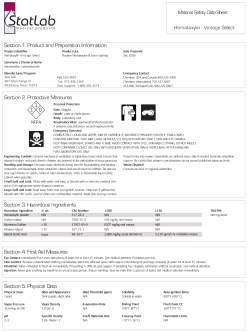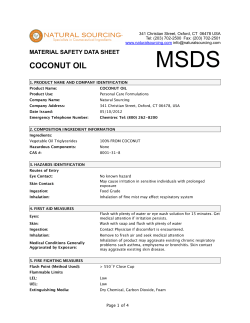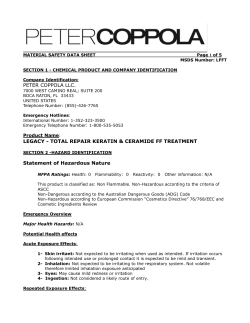
Safety Data Sheet according to Regulation (EC
Safety Data Sheet according to Regulation (EC) No1907/2006 Page 1 of 8 SDS No. : 328154 V002.3 AQUENCE DL 270 known as DURO-LOK 270 Revision: 11.07.2014 printing date: 27.04.2015 SECTION 1: Identification of the substance/mixture and of the company/undertaking 1.1. Product identifier AQUENCE DL 270 known as DURO-LOK 270 1.2. Relevant identified uses of the substance or mixture and uses advised against Intended use: Wood adhesives 1.3. Details of the supplier of the safety data sheet Henkel AG & Co. KGaA Henkelstr. 67 40589 Düsseldorf Germany Phone: Fax-no.: +49 (211) 797 0 +49 (211) 798 4008 ua-productsafety.de@henkel.com 1.4. Emergency telephone number The Henkel information service also provides an around-the-clock telephone service on phone no.+49-(0)211-797-3350 for exceptional cases. SECTION 2: Hazards identification 2.1. Classification of the substance or mixture Classification (CLP): The substance or mixture is not hazardous according to Regulation (EC) No 1272/2008 (CLP). Classification (DPD): No classification required. 2.2. Label elements Label elements (CLP): The substance or mixture is not hazardous according to Regulation (EC) No 1272/2008 (CLP). Supplemental information EUH210 Safety data sheet available on request. MSDS-No.: 328154 V002.3 AQUENCE DL 270 known as DURO-LOK 270 Page 2 of 8 Label elements (DPD): The product is not subject to classification according to the calculation methods of the "General Classification Guideline for Preparations of the EC" as issued in the last version. Additional labeling: Safety data sheet available for professional user on request. 2.3. Other hazards None if used properly. SECTION 3: Composition/information on ingredients General chemical description: Dispersion adhesive, water-based Base substances of preparation: Ethylene-vinyl acetate copolymer Declaration of the ingredients according to CLP (EC) No 1272/2008: Hazardous components CAS-No. Hydroxy-2-methylpentan-4-on-2 123-42-2 EC Number REACH-Reg No. 204-626-7 01-2119473975-21 content Classification < 2% Flammable liquids 3 H226 Serious eye irritation 2 H319 For full text of the H - statements and other abbreviations see section 16 "Other information". Substances without classification may have community workplace exposure limits available. Declaration of ingredients according to DPD (EC) No 1999/45: Hazardous components CAS-No. Hydroxy-2-methylpentan-4-on-2 123-42-2 EC Number REACH-Reg No. 204-626-7 01-2119473975-21 content Classification < 2 % Xi - Irritant; R36 For full text of the R-Phrases indicated by codes see section 16 'Other Information'. Substances without classification may have community workplace exposure limits available. SECTION 4: First aid measures 4.1. Description of first aid measures Inhalation: Move to fresh air, consult doctor if complaint persists. Skin contact: Rinse with running water and soap. Apply replenishing cream. Change all contaminated clothing. Eye contact: Rinse immediately with plenty of running water (for 10 minutes). Seek medical attention if necessary. Ingestion: Rinse mouth, drink 1-2 glasses of water, do not induce vomiting, consult a doctor. 4.2. Most important symptoms and effects, both acute and delayed No data available. 4.3. Indication of any immediate medical attention and special treatment needed See section: Description of first aid measures MSDS-No.: 328154 V002.3 AQUENCE DL 270 known as DURO-LOK 270 SECTION 5: Firefighting measures 5.1. Extinguishing media Suitable extinguishing media: All common extinguishing agents are suitable. Extinguishing media which must not be used for safety reasons: High pressure waterjet 5.2. Special hazards arising from the substance or mixture In the event of a fire, carbon monoxide (CO) and carbon dioxide (CO2) can be released. Acetic acid 5.3. Advice for firefighters Wear self-contained breathing apparatus. Wear protective equipment. SECTION 6: Accidental release measures 6.1. Personal precautions, protective equipment and emergency procedures Wear protective equipment. Danger of slipping on spilled product. 6.2. Environmental precautions Do not empty into drains / surface water / ground water. 6.3. Methods and material for containment and cleaning up Remove with liquid-absorbing material (sand, peat, sawdust). Dispose of contaminated material as waste according to Section 13. 6.4. Reference to other sections See advice in section 8 SECTION 7: Handling and storage 7.1. Precautions for safe handling Hygiene measures: Do not eat, drink or smoke while working. Wash hands before work breaks and after finishing work. 7.2. Conditions for safe storage, including any incompatibilities Ensure good ventilation/extraction. Temperatures between + 5 °C and + 35 °C Store in a cool, dry place. 7.3. Specific end use(s) Wood adhesives Page 3 of 8 MSDS-No.: 328154 V002.3 AQUENCE DL 270 known as DURO-LOK 270 Page 4 of 8 SECTION 8: Exposure controls/personal protection 8.1. Control parameters Occupational Exposure Limits Valid for Germany Ingredient 2-(2-Butoxyethoxy)ethyl acetate 124-17-4 ppm 10 mg/m3 67 2-(2-Butoxyethoxy)ethyl acetate 124-17-4 4-Hydroxy-4-methylpentan-2-one 123-42-2 4-Hydroxy-4-methylpentan-2-one 123-42-2 4-Hydroxy-4-methylpentan-2-one 123-42-2 Type AGW: Short Term Exposure Classification: 20 96 AGW: Skin designation: Short Term Exposure Classification: Category 1.5 If the AGW and BGW values are complied with, there should be no risk of reproductive damage (see Number 2.7). Category I: substances for which the localized effect has an assigned OEL or for substances with a sensitizing effect in respiratory passages. 2 Remarks TRGS 900 Can be absorbed through the skin. Category I: substances for which the localized effect has an assigned OEL or for substances with a sensitizing effect in respiratory passages. TRGS 900 TRGS 900 TRGS 900 TRGS 900 Derived No-Effect Level (DNEL): Name on list Application Area worker Route of Exposure inhalation 4-hydroxy-4-methylpentan-2-one 123-42-2 worker Dermal 4-hydroxy-4-methylpentan-2-one 123-42-2 worker inhalation 4-hydroxy-4-methylpentan-2-one 123-42-2 worker inhalation 4-hydroxy-4-methylpentan-2-one 123-42-2 general population inhalation 4-hydroxy-4-methylpentan-2-one 123-42-2 general population Dermal 4-hydroxy-4-methylpentan-2-one 123-42-2 general population inhalation 4-hydroxy-4-methylpentan-2-one 123-42-2 general population oral 4-hydroxy-4-methylpentan-2-one 123-42-2 general population inhalation 4-hydroxy-4-methylpentan-2-one 123-42-2 Health Effect Acute/short term exposure - local effects Long term exposure systemic effects Long term exposure systemic effects Long term exposure - local effects Acute/short term exposure - local effects Long term exposure systemic effects Long term exposure systemic effects Long term exposure systemic effects Long term exposure - local effects Exposure Time Value 240 mg/m3 9,4 mg/kg bw/day 66,4 mg/m3 66,4 mg/m3 120 mg/m3 3,4 mg/kg bw/day 11,8 mg/m3 3,4 mg/kg bw/day 11,8 mg/m3 Remarks MSDS-No.: 328154 V002.3 AQUENCE DL 270 known as DURO-LOK 270 Page 5 of 8 Biological Exposure Indices: None 8.2. Exposure controls: Engineering controls: Ensure good ventilation/extraction. Respiratory protection: In case of aerosol formation, we recommend wearing of appropriate respiratory protection equipment with ABEK P2 filter. This recommendation should be matched to local conditions. Hand protection: Chemical-resistant protective gloves (EN 374). Suitable materials for short-term contact or splashes (recommended: at least protection index 2, corresponding to > 30 minutes permeation time as per EN 374): Polychloroprene (CR; >= 1 mm thickness) or natural rubber (NR; >=1 mm thickness) Suitable materials for longer, direct contact (recommended: protection index 6, corresponding to > 480 minutes permeation time as per EN 374): Polychloroprene (CR; >= 1 mm thickness) or natural rubber (NR; >=1 mm thickness) This information is based on literature references and on information provided by glove manufacturers, or is derived by analogy with similar substances. Please note that in practice the working life of chemical-resistant protective gloves may be considerably shorter than the permeation time determined in accordance with EN 374 as a result of the many influencing factors (e.g. temperature). If signs of wear and tear are noticed then the gloves should be replaced. Eye protection: Protective goggles Skin protection: Wear protective equipment. Advices to personal protection equipment: Use only personal protection that's CE-labelled according to the regulation no. 819 of 19 August 1994. SECTION 9: Physical and chemical properties 9.1. Information on basic physical and chemical properties Appearance dispersion liquid white Odor typical Odour threshold No data available / Not applicable pH (20 °C (68 °F)) Initial boiling point Flash point Decomposition temperature Vapour pressure Density Bulk density Viscosity (Brookfield; Instrument: RVT; 20 °C (68 °F); speed of rotation: 20 min-1; Spindle No: 5) Viscosity (kinematic) Explosive properties Solubility (qualitative) (20 °C (68 °F); Solvent: Water) Solidification temperature Melting point Flammability Auto-ignition temperature Explosive limits Partition coefficient: n-octanol/water Evaporation rate Vapor density Oxidising properties 4,7 - 5,2 No data available / Not applicable No flash point up to 250 °C No data available / Not applicable No data available / Not applicable No data available / Not applicable No data available / Not applicable 4.500 - 7.500 mPa.s No data available / Not applicable No data available / Not applicable Soluble No data available / Not applicable No data available / Not applicable No data available / Not applicable No data available / Not applicable No data available / Not applicable No data available / Not applicable No data available / Not applicable No data available / Not applicable No data available / Not applicable MSDS-No.: 328154 V002.3 AQUENCE DL 270 known as DURO-LOK 270 Page 6 of 8 9.2. Other information No data available / Not applicable SECTION 10: Stability and reactivity 10.1. Reactivity None if used for intended purpose. 10.2. Chemical stability Stable under recommended storage conditions. 10.3. Possibility of hazardous reactions See section reactivity 10.4. Conditions to avoid None if used for intended purpose. 10.5. Incompatible materials None if used properly. 10.6. Hazardous decomposition products At higher temperatures acetic acid may be released. SECTION 11: Toxicological information 11.1. Information on toxicological effects General toxicological information: The mixture is classified based on the available hazard information for the ingredients as defined in the classification criteria for mixtures for each hazard class or differentiation in Annex I to Regulation 1272/2008/EC. Relevant available health/ecological information for the substances listed under Section 3 is provided in the following. Acute oral toxicity: Hazardous components CAS-No. Value type Value Route of application Exposure time Species Method Value type Value Route of application Exposure time Species Method Value type Value Route of application Exposure time Species Method Exposure time Species Method rabbit EU Method B.5 (Acute Toxicity: Eye Irritation / Corrosion) Acute inhalative toxicity: Hazardous components CAS-No. Acute dermal toxicity: Hazardous components CAS-No. Serious eye damage/irritation: Hazardous components CAS-No. Hydroxy-2-methylpentan4-on-2 123-42-2 Result moderately irritating Germ cell mutagenicity: Hazardous components CAS-No. Hydroxy-2-methylpentan4-on-2 123-42-2 Result negative Type of study / Route of administration bacterial reverse mutation assay (e.g Ames test) Metabolic activation / Exposure time with and without Species Method OECD Guideline 471 (Bacterial Reverse Mutation Assay) MSDS-No.: 328154 V002.3 AQUENCE DL 270 known as DURO-LOK 270 Page 7 of 8 SECTION 12: Ecological information General ecological information: The mixture is classified based on the available hazard information for the ingredients as defined in the classification criteria for mixtures for each hazard class or differentiation in Annex I to Regulation 1272/2008/EC. Relevant available health/ecological information for the substances listed under Section 3 is provided in the following. Do not empty into drains, soil or bodies of water. 12.1. Toxicity Hazardous components CAS-No. Value type Value Exposure time Species Method 420 mg/l Acute Toxicity Study Fish Hydroxy-2-methylpentan-4on-2 123-42-2 Hydroxy-2-methylpentan-4on-2 123-42-2 LC50 96 h Lepomis macrochirus 9.000 mg/l Daphnia 24 h Daphnia magna OECD Guideline 203 (Fish, Acute Toxicity Test) OECD Guideline 202 (Daphnia sp. Acute Immobilisation Test) EC50 12.2. Persistence and degradability No data available. 12.3. Bioaccumulative potential / 12.4. Mobility in soil No data available. 12.5. Results of PBT and vPvB assessment Hazardous components CAS-No. Hydroxy-2-methylpentan-4-on-2 123-42-2 PBT/vPvB Not fulfilling Persistent, Bioaccumulative and Toxic (PBT), very Persistent and very Bioaccumulative (vPvB) criteria. 12.6. Other adverse effects No data available. SECTION 13: Disposal considerations 13.1. Waste treatment methods Product disposal: In consultation with the responsible local authority, must be subjected to special treatment. Waste code The valid EWC waste code numbers are source-related. The manufacturer is therefore unable to specify EWC waste codes for the articles or products used in the various sectors. The EWC codes listed are intended as a recommendation for users. We will be happy to advise you. 08 04 09 Waste adhesives and sealants containing organic solvents or other dangerous substances MSDS-No.: 328154 V002.3 AQUENCE DL 270 known as DURO-LOK 270 Page 8 of 8 SECTION 14: Transport information 14.1. UN number Not hazardous according to RID, ADR, ADNR, IMDG, IATA-DGR. 14.2. UN proper shipping name Not hazardous according to RID, ADR, ADNR, IMDG, IATA-DGR. 14.3. Transport hazard class(es) Not hazardous according to RID, ADR, ADNR, IMDG, IATA-DGR. 14.4. Packaging group Not hazardous according to RID, ADR, ADNR, IMDG, IATA-DGR. 14.5. Environmental hazards Not hazardous according to RID, ADR, ADNR, IMDG, IATA-DGR. 14.6. Special precautions for user Not hazardous according to RID, ADR, ADNR, IMDG, IATA-DGR. 14.7. Transport in bulk according to Annex II of MARPOL 73/78 and the IBC Code not applicable SECTION 15: Regulatory information 15.1. Safety, health and environmental regulations/legislation specific for the substance or mixture VOC content 0,00 % (VOCV 814.018 VOC regulation CH) 15.2. Chemical safety assessment A chemical safety assessment has not been carried out. National regulations/information (Germany): WGK: Storage class according to TRGS 510: 1, slightly water-endangering product. (German VwVwS of July 27, 2005 ) Classification in conformity with the calculation method 10 SECTION 16: Other information The labelling of the product is indicated in Section 2. The full text of all abbreviations indicated by codes in this safety data sheet are as follows: R36 Irritating to eyes. H226 Flammable liquid and vapor. H319 Causes serious eye irritation. Further information: This information is based on our current level of knowledge and relates to the product in the state in which it is delivered. It is intended to describe our products from the point of view of safety requirements and is not intended to guarantee any particular properties.
© Copyright 2025










